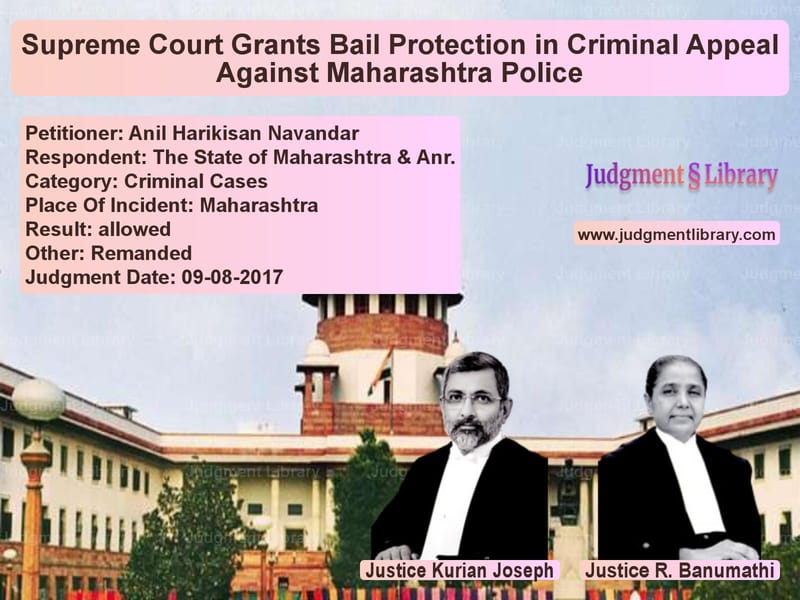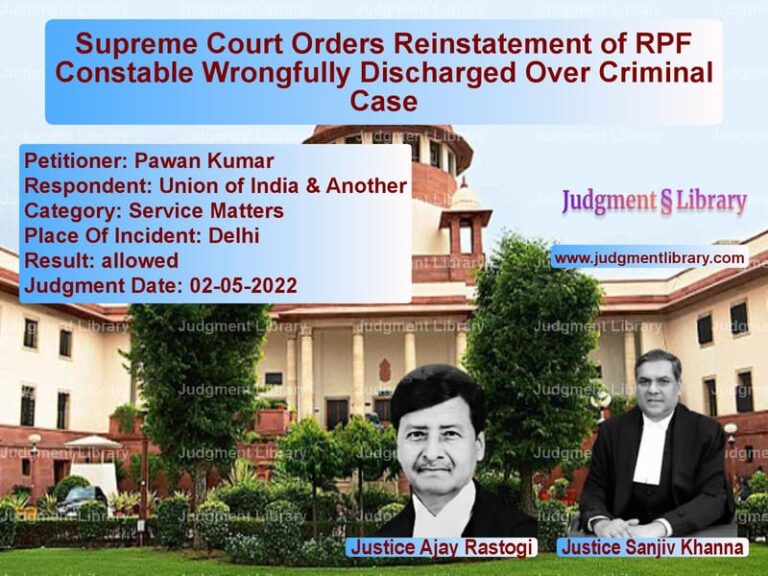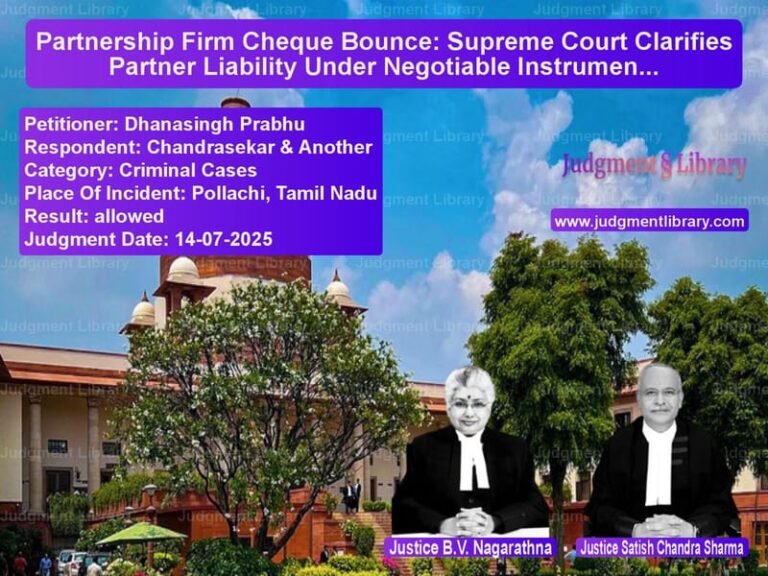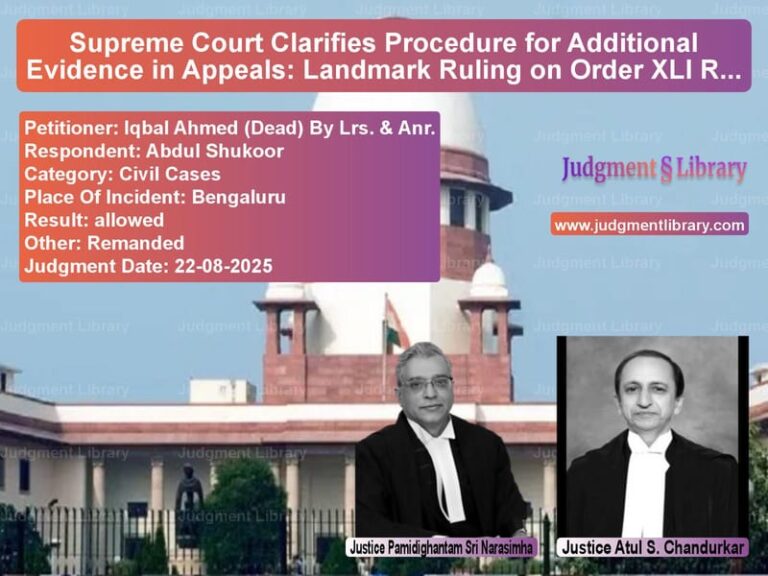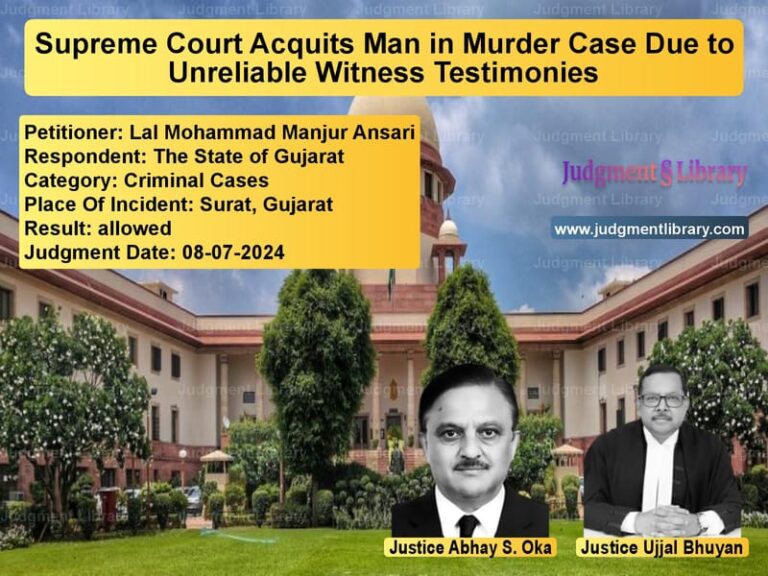Supreme Court Grants Bail Protection in Criminal Appeal Against Maharashtra Police
The Supreme Court, in the case of Anil Harikisan Navandar vs. The State of Maharashtra & Anr., delivered a judgment concerning anticipatory bail under Section 438 of the Criminal Procedure Code (Cr.P.C.). The Court ruled in favor of the appellants, directing that if summoned in connection with the case, their bail applications should be considered by the trial court without unnecessary delay.
Background of the Case
The appellants, including Anil Harikisan Navandar, were accused in a criminal case and sought anticipatory bail. Their applications were denied by the High Court of Bombay, leading them to approach the Supreme Court. While the case was pending before the Supreme Court, the appellants were granted interim protection from arrest.
The key legal issue revolved around whether the High Court was justified in denying anticipatory bail, and whether the Supreme Court should grant relief to the appellants given that Accused No. 1 had already been granted bail.
Key Legal Issues Considered
- Whether the High Court erred in denying anticipatory bail to the appellants.
- Whether the pending trial justified continued denial of bail.
- Whether the Supreme Court should intervene and provide protection to the appellants.
- Whether any High Court observations should influence the trial proceedings.
Petitioner’s (Appellants’) Arguments
The appellants, through their counsel, argued:
- They had cooperated with the investigation and were not flight risks.
- The trial had been pending for over a year, and prolonged legal proceedings should not deprive them of bail.
- The High Court’s findings were preliminary and should not have been used to deny anticipatory bail.
- Since Accused No. 1 had already been granted bail, similar relief should be extended to them.
Respondent’s (State of Maharashtra) Arguments
The prosecution argued:
- The High Court had considered the matter in detail and found reasons to deny anticipatory bail.
- The nature of the accusations warranted continued legal scrutiny and justified the denial of bail.
- The trial should proceed uninfluenced by any relief granted by the Supreme Court.
Supreme Court’s Analysis and Judgment
The Supreme Court, comprising Justices Kurian Joseph and R. Banumathi, ruled in favor of the appellants, observing that the legal process should not unduly prolong the denial of bail.
1. Granting Bail Protection Without Delay
The Court observed that since Accused No. 1 had already been granted bail, it was logical to extend similar relief to the appellants:
“As and when the Investigating Officer files a final report under Section 173(2) Cr.P.C. and in case the appellants are summoned, they shall surrender before the Trial Court and their applications for bail shall be considered without further delay.”
2. Clarification on Trial Court’s Independence
The Court clarified that the trial court should proceed without being influenced by the High Court’s findings:
“The Trial Court will proceed with the trial uninfluenced by any of the observations and findings made by the High Court in the impugned judgment.”
3. Avoiding Unnecessary Delays in Bail Consideration
The Supreme Court acknowledged that the matter had been pending before it for over a year and saw no reason to keep the appeal pending further. The Court, therefore, disposed of the appeals with directions to the trial court to consider bail applications promptly.
Final Orders
- The Supreme Court directed that the appellants be allowed to apply for bail once the charge sheet was filed.
- The trial court was instructed to decide on the bail applications without unnecessary delay.
- The trial court was asked to ensure that the proceedings were not influenced by the High Court’s previous findings.
Legal Implications
1. Protection of Bail Rights
The ruling reinforces that prolonged trial proceedings should not unduly affect an accused person’s right to seek bail.
2. Limiting the Influence of Higher Court Observations
The judgment ensures that findings made at an earlier stage do not bias the trial court’s decision-making.
3. Fast-Tracking Bail Decisions
The Supreme Court’s directive emphasizes the importance of timely decision-making in bail matters.
Conclusion
The Supreme Court’s ruling in Anil Harikisan Navandar vs. The State of Maharashtra provides clarity on anticipatory bail rights and reinforces fair trial principles. By ensuring that the appellants receive timely bail consideration, the judgment upholds the balance between judicial scrutiny and personal liberty.
Don’t miss out on the full details! Download the complete judgment in PDF format below and gain valuable insights instantly!
Download Judgment: Anil Harikisan Navan vs The State of Maharas Supreme Court of India Judgment Dated 09-08-2017.pdf
Direct Downlaod Judgment: Direct downlaod this Judgment
See all petitions in Bail and Anticipatory Bail
See all petitions in Fraud and Forgery
See all petitions in Custodial Deaths and Police Misconduct
See all petitions in Judgment by Kurian Joseph
See all petitions in Judgment by R. Banumathi
See all petitions in allowed
See all petitions in Remanded
See all petitions in supreme court of India judgments August 2017
See all petitions in 2017 judgments
See all posts in Criminal Cases Category
See all allowed petitions in Criminal Cases Category
See all Dismissed petitions in Criminal Cases Category
See all partially allowed petitions in Criminal Cases Category

